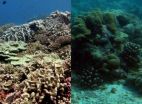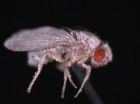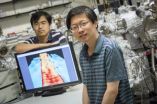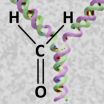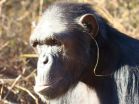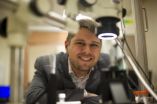(Press-News.org) A new study by biologists at San Diego State University and Scripps Institution of Oceanography shows that inhabited coral islands that engage in commercial fishing dramatically alter their nearby reef ecosystems, disturbing the microbes, corals, algae and fish that call the reef home.
The study's lead author, Linda Wegley Kelly, is a postdoctoral scholar in the lab of SDSU virologist Forest Rohwer.
For the study, she looked at seawater samples collected from the surfaces of reefs surrounding all 11 of the Line Islands, a chain of atolls in the central Pacific Ocean. Over the past five years, Kelly and her colleagues have made sporadic trips to the islands, collecting the samples with a specially adapted bilge pump that sucks up approximately 100 liters of water in a given area.
Kelly sequenced the microbiomes of the samples to determine the DNA encoded by the viruses, bacteria, archaea (tiny, single-celled microorganisms like Halobacteria), and protists (similarly tiny eukaryotic microorganisms such as diatoms) all living in the same space. Within these millions of DNA sequences, Kelly found that certain types of bacteria predicted whether the reef was predominantly composed up of coral or algae.
Algae or coral?
The preponderance of either of these organisms has huge ramifications for the health of the surrounding sea.
"Corals are fierce competitors for space on the reef," Kelly said. "In a healthy marine environment, reefs support a vibrant population of corals and other calcifying organisms that continuously build the reef skyward."
If reefs are dominated by algae, however, the entire habitat dissolves over time and the fish don't have anywhere to go, Kelly explained.
When she sequenced the surfaces of algae-covered reefs, Kelly identified microbes that may contribute to an ecological feedback loop which impairs coral growth. Her study was published this week in the Proceedings of the National Academy of Sciences.
Population centers
Another observation, that the reef microbiomes on unpopulated islands were more similar to one another than to other geographically closer — but populated — islands, suggests that the entire community of reef inhabitants, including the microbes, is more significantly influenced by the degree of the reef's coral or algal cover than researchers previously realized.
Her results have implications for conservationists looking for ways to improve strategies for managing coral reef ecosystems.
"How do you create an environment for corals to thrive?" Kelly asked. "In addition to practicing sustainable fishing, one way to rehabilitate a reef would be to transplant corals to the site. This should promote an environment more conducive to coral growth by fostering a beneficial community of microorganisms."
INFORMATION:
About San Diego State University
San Diego State University is a major public research institution offering bachelor's degrees in 89 areas, master's degrees in 78 areas and doctorates in 21 areas. The university provides transformative experiences, both inside and outside of the classroom, for its 35,000 students. Students participate in research, international experiences, sustainability and entrepreneurship initiatives, and a broad range of student life and leadership opportunities. The university's rich campus life features opportunities for students to participate in, and engage with, the creative and performing arts, a Division I athletics program and the vibrant cultural life of the San Diego region. For more information, visit http://www.sdsu.edu.
Rethinking the reef
In a new study, an SDSU biologist dove deep into how algal and coral cover affect the microscopic life that call the reef home
2014-07-03
ELSE PRESS RELEASES FROM THIS DATE:
Fruit fly immunity fails with fungus after (space)flight
2014-07-03
Before you swat away the next fruit fly, consider instead just how similar its biological complexities are to our own. In a study published in PLOS ONE, researchers led by Deborah Kimbrell, Ph.D., at the University of California, Davis (UC Davis) and their collaborators, studied how microorganisms may alter fruit flies' immunity in space and in hypergravity, or increased gravity. The article is titled "Toll Mediated Infection Response Is Altered by Gravity and Spaceflight in Drosophila."
This study suggests that having normal gravity or hypergravity on the space station ...
Drug shows promise for effectively treating metabolic syndrome
2014-07-03
(SALT LAKE CITY)—University of Utah researchers have discovered that an enzyme involved in intracellular signaling plays a crucial role in developing metabolic syndrome, a finding that has a U of U spinoff company developing a drug to potentially treat the condition.
The researchers, led by Jared Rutter, Ph.D., professor of biochemistry, hope to begin human clinical trials of a drug in the next couple of years.
"The approved drug therapies do not treat or prevent this condition in most people," says Rutter, senior author of a study describing the research published ...
With 'ribbons' of graphene, width matters
2014-07-03
MILWAUKEE – Using graphene ribbons of unimaginably small widths – just several atoms across – a group of researchers at the University of Wisconsin-Milwaukee (UWM) has found a novel way to "tune" the wonder material, causing the extremely efficient conductor of electricity to act as a semiconductor.
In principle, their method for producing these narrow ribbons – at a width roughly equal to the diameter of a strand of human DNA – and manipulating the ribbons' electrical conductivity could be used to produce nano-devices.
Graphene, a one-atom-thick sheet of carbon atoms, ...
Bone marrow fat tissue secretes hormone that helps body stay healthy
2014-07-03
ANN ARBOR, Mich. — It has been known for its flavorful addition to soups and as a delicacy for dogs but bone marrow fat may also have untapped health benefits, new research finds.
A University of Michigan-led study shows that the fat tissue in bone marrow is a significant source of the hormone adiponectin, which helps maintain insulin sensitivity, break down fat, and has been linked to decreased risk of cardiovascular disease, diabetes, and obesity-associated cancers. The findings appear in today's online-ahead-of-print issue of Cell Metabolism.
Bone marrow adipose ...
NASA sees Hurricane Arthur's cloud-covered eye
2014-07-03
When NASA's Aqua satellite passed over Tropical Storm Arthur on July 2 at 2:50 p.m. EDT on July 2, it saw a cloud-covered eye as the storm was on the way to becoming a hurricane.
This visible image of Tropical Storm Arthur was captured by the Moderate Resolution Imaging Spectroradiometer or MODIS instrument that flies aboard NASA's Aqua satellite. Arthur's center was over the Atlantic Ocean and east of Florida's northeast coast. By 5 a.m. EDT on July 3, Arthur's eye had formed but remained cloud covered even as the storm hit hurricane-strength with maximum sustained ...
Cellular defence against fatal associations between proteins and DNA
2014-07-03
This news release is available in German.
DNA - the carrier of genetic information - is constantly threatened by damage originating from exogenous and endogenous sources. Very special DNA lesions are DNA-protein crosslinks - proteins covalently linked to DNA. So far hardly anything was known about repair mechanisms specifically targeting DNA-protein crosslinks. Stefan Jentsch's team at the Max Planck Institute of Biochemistry in Martinsried, Germany, now discovered a protease that is able to chop down the protein component of DNA-protein crosslinks, thereby enabling ...
'Grass-in-the-ear' technique sets new trend in chimp etiquette
2014-07-03
Chimpanzees are copycats and, in the process, they form new traditions that are often particular to only one specific group of these primates. Such are the findings of an international group of scientists, who waded through over 700 hours of video footage to understand how it came about that one chimpanzee stuck a piece of grass in her ear and started a new trend, and others soon followed suit. The findings of the study, led by Edwin van Leeuwen of the Max Planck Institute for Psycholinguistics in The Netherlands, are published in Springer's journal Animal Cognition.
In ...
GW researchers: Acute kidney injury and chronic kidney disease as interconnected syndromes
2014-07-03
WASHINGTON (July 3, 2014) — For more than 40 years, physicians have treated diminished kidney function as two distinct syndromes: acute kidney injury (AKI) and chronic kidney disease (CKD). However, recent epidemiologic and mechanistic studies suggest the two syndromes are not distinct entities, but interconnected. Published today in The New England Journal of Medicine, George Washington University (GW) researchers call for greater follow-up care of patients with AKI, who often present with CKD later in life, and vice versa.
"Our teaching has been wrong and the approach ...
Weighing up the secrets of African elephant body fat
2014-07-03
A research team from The University of Nottingham has carried out the first molecular characterisation of the African elephant's adipose tissue — body fat. This new information will form the basis of future studies aimed at securing the health and future survival of captive elephants.
The population of captive elephants, both Asian and African, in Europe and North America is not self-sustaining, largely due to poor fertility, resulting in a fewer baby elephants being born. It is acknowledged that if a solution for these reproductive difficulties cannot be found quickly, ...
Identifying microbial species
2014-07-03
Millions of microbial species populate the world, but so far only a few have been identified due to the inability of most microbes to grow in the laboratory. Edgar Goluch, an engineer, and Slava Epstein, a biologist, aim to change this. The pair, both researchers at Northeastern University, has developed a device that allows scientists to cultivate a single species of bacteria that can then be studied and identified.
Goluch's previous research devices incorporated permeable membranes that allow sequestered bacteria to be exposed to the nutrients and molecules of their ...
LAST 30 PRESS RELEASES:
2026 Young Investigators: ONR celebrates new talent tackling warfighter challenges
Genetics help explain who gets the ‘telltale tingle’ from music, art and literature
Many Americans misunderstand medical aid in dying laws
Researchers publish landmark infectious disease study in ‘Science’
New NSF award supports innovative role-playing game approach to strengthening research security in academia
Kumar named to ACMA Emerging Leaders Program for 2026
AI language models could transform aquatic environmental risk assessment
New isotope tools reveal hidden pathways reshaping the global nitrogen cycle
Study reveals how antibiotic structure controls removal from water using biochar
Why chronic pain lasts longer in women: Immune cells offer clues
Toxic exposure creates epigenetic disease risk over 20 generations
More time spent on social media linked to steroid use intentions among boys and men
New study suggests a “kick it while it’s down” approach to cancer treatment could improve cure rates
Milken Institute, Ann Theodore Foundation launch new grant to support clinical trial for potential sarcoidosis treatment
New strategies boost effectiveness of CAR-NK therapy against cancer
Study: Adolescent cannabis use linked to doubling risk of psychotic and bipolar disorders
Invisible harms: drug-related deaths spike after hurricanes and tropical storms
Adolescent cannabis use and risk of psychotic, bipolar, depressive, and anxiety disorders
Anxiety, depression, and care barriers in adults with intellectual and developmental disabilities
Study: Anxiety, gloom often accompany intellectual deficits
Massage Therapy Foundation awards $300,000 research grant to the University of Denver
Gastrointestinal toxicity linked to targeted cancer therapies in the United States
Countdown to the Bial Award in Biomedicine 2025
Blood marker from dementia research could help track aging across the animal world
Birds change altitude to survive epic journeys across deserts and seas
Here's why you need a backup for the map on your phone
ACS Central Science | Researchers from Insilico Medicine and Lilly publish foundational vision for fully autonomous “Prompt-to-Drug” pharmaceutical R&D
Increasing the number of coronary interventions in patients with acute myocardial infarction does not appear to reduce death rates
Tackling uplift resistance in tall infrastructures sustainably
Novel wireless origami-inspired smart cushioning device for safer logistics
[Press-News.org] Rethinking the reefIn a new study, an SDSU biologist dove deep into how algal and coral cover affect the microscopic life that call the reef home
